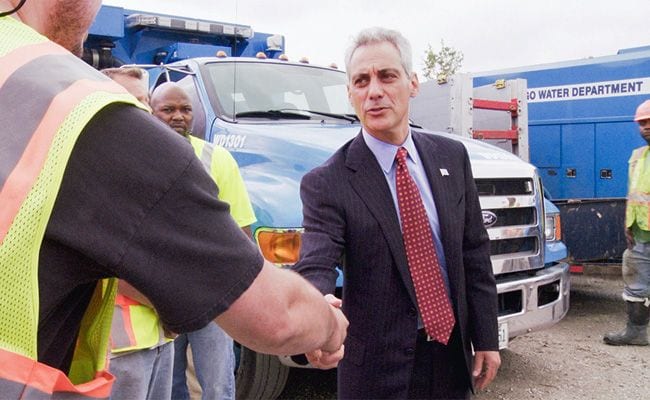
“This has to be done in a very thoughtful way. We have to make the changes that are necessary so our children don’t continue to go to schools that are not achieving the goals that they need to achieve academically. So the implementation is going forward as we talk right now.” Chicago’s mayor Rahm Emanuel stands at a podium, flag behind him and mics in front, his hand moving up and down in a rhythm with his words. The camera in Chicagoland cuts on similar beats to close-ups of assembled reporters, a row of faces, a yellow notebook or a cell phone.
Asked how he might respond to residents who would blame the mayor if one kid is hurt on her way to school, Emanuel’s gestures become more emphatic: “My responsibility starts when doors to the future of a child are closed. Fifty-six percent of African American male adolescents are dropping out.” Cut to more reporters, more pens on paper. As he walks out of frame, his figure blurrs as if the camera can’t keep up, you hear another reporter trying to ask another question from off-screen.
This is pretty much how it goes on Chicagoland: Emmanuel against everyone else. The eight-part docu-series premieres 6 March on CNN with diverse, beautifully composed shots of the city: workers, skateboarders, teachers on strike, Nate Robinson. “Chicagoans do not put up with the bullshit,” asserts one guy in a bar. This apparently despite its notoriously longtime mayoral dynasty.
Emanuel is posited by narrator Mark Konkol as a change from the Daleys, who ran the town for decades. (It’s a little glaring that the show doesn’t make a connection between the Daleys’ machine and the city’s gangster history, though Konkol does wonder whether “there’s something in the water here” when he lists names like Capone, the Latin Kings, and Larry Hoover.)
The new “boss” is different: he makes jokes, he does yoga, he likes to say how much he loves the people, who make Chicago “the warmest place in America.” That’s not to say he’s not legendarily tough (here the show offers a brief photo montage of his time in the Clinton and Obama administrations, as “Rahmbo”), only that he means work with people to “get things done.”
Just so, Emanuel appears early in Chicagoland‘s first episode riding in his car to City Hall, cell phone to his ear, hard at work. First up: failing public schools and street violence, a set of problems desperately intertwined with poverty and hopelessness. The administration’s decision to close 50 schools incites loud and ongoing protests by teachers and parents and, so telegenically, third grader Asean Johnson. The show pitches back and forth between Emanuel’s office and Teachers Union president Karen Lewis, aligned with worried parents. Teachers march with placards, Emanuel meets with police superintendent Garry McCarthy, nodding as they agree they must keep students safe as they walk to school through dangerous neighborhoods.
The show doesn’t get into details of the conflict, though it does make clear that each side doubts each other’s honesty and seriousness of the other. In between, sort of, the show offers Elizabeth Dozier, principal at Fenger High School, which has undergone a remarkable recovery over the past four years, in large part because of a federal grant. Now, as you watch her encouraging her students in hallways and yelling at anonymous troublemakers on a nearby sidewalk (“Gentlemen! Not going to happen, not today, move on!”), you learn that the grant is running out and, thanks to the Emanuel administration’s restructuring, funding to public schools is being cut.
How will she be able to afford reading tutors, home advocates? Will she have the services of Dean Robert Spicer, who brings fighting students together in his office for a peace circle? Spicer sums it up: “Using zero tolerance was never going to work. I began to bring in the practices of restorative justice.”
You might begin to wonder how such an approach might work for Emanuel and company, as his administration proceeds to “implement” plans that so distress their constituents. While Emanuel entertains super-rich white guys (say, Google CEO Eric Schmidt), soliciting funds for tech sectors and other profitable innovations in the city, Dozier makes do with decreasing resources, putting her own body between young men with guns and her students.
Karen Lewis acknowledges the need to solicit corporate funding, but also underlines why public schools are now tied to the business world, because “those same corporations don’t have to pay the taxes they used to pay to fund public schools.” None of these solutions seems wholly adequate to the crises that are at once immediate and looming. As Chicagoland presents the crises, it’s not clear where the resolutions might emerge.


![Call for Papers: All Things Reconsidered [MUSIC] May-August 2024](https://www.popmatters.com/wp-content/uploads/2024/04/all-things-reconsidered-call-music-may-2024-720x380.jpg)



